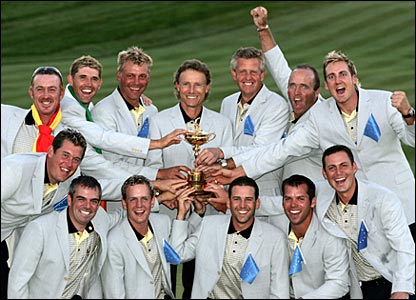The fallout and soul-searching from the USA’s five point Gleneagles loss continues.
It seems everyone on the opposite side of ‘The Pond’ has a view what should be done to correct the fact Europe has won eight of the past 10 Ryder Cup’s.
However it was victorious 2006 European Captain Bernhard Langer who has it right in stating it is the friendships among the European players that is vital to Europe’s recent dominance compared to the ‘individuality’ so long the make-up of the PGA Tour.
And this is despite calls now from former US Ryder Cup captains and players declaring they would like to have more direct involvement in decision-making surrounding future matches as the Americans seek ways to end a three-event losing streak.
Since Phil Mickelson’s public comments on team disunity many other former USA Ryder Cup stars said the PGA of America, which selects the team’s captain and players, needs to reach out more to past captains and players to create unity and an improved team environment.
“It can’t hurt,” said Kenny Perry, who played on the US’ last winning team under Paul Azinger in 2008.
“They didn’t call Paul. That was shocking. You need to not leave any stone unturned. The Europeans buy into their captain. They’re in love with their guy. They’ll jump over the wall for him if he tells them to do that.”
“We all agree it’s time to step back and give it a look,” Bevacqua told the Palm Beach Post. “We feel this is the perfect time to do an analysis on all components of the Ryder Cup. It’s going to be an open process, a real inclusive process.”
But then it was Langer, who captained the European team to a nine-point win over hapless USA Captain Hal Sutton’s squad in 2004, who hit the nail right on the head and singling out the American’s ‘individuality’ compared to the European’s ‘unity’.
“The European Team is just a close-knit unit where players have closer friendships on the European side than over here,” said Langer ahead of this week’s Champions Tour’s SAS Championship in Cary, North Carolina.
“Over here, it’s more individuals, I think, and maybe bigger egos as well.”
The European team, comprised of 12 players from different countries throughout the continent, comes together every two years unified in one goal, he said, and it’s more focused on beating America than it is about winning for Europe.
“The French don’t like the English and the Germans don’t like this and the Spanish don’t like that,” he said. “But we’re all thrown together and we all become one.”
Before serving as captain, Langer said, he used his knowledge and input from previous captains he had played under to develop his leadership style.
“I saw what some of them did well and what some of them did not do so well,” he said. “Then I took the best out of every captain that I saw and then I brought my own stuff in, too.”
And there’s the suggestion from two-time US Open winner Lee Janzen, who played under Watson on the winning 1993 US team and was on the losing 1997 team under Tom Kite, indicating he would be in favour of selecting six core players now and then adding the remaining six players closer to the event’s date.
Under his plan, the first six players selected would then be asked to build unity among other potential US players leading up to the 2016 matches.
Janzen, a Minnesota native, referenced the philosophy used by Herb Brooks, the former University of Minnesota hockey coach, when he selected members of the 1980 US Olympic team.
That team was made up entirely of US college hockey players and went on to win the gold medal, defeating the Soviet Union in a semi-final meeting that became known as the “Miracle on Ice.”
“I don’t want to find the 12 best guys,” Janzen said. “I want to find the 12 right guys. That’s what Herb did.”
That may have worked with 12 non-professionals on the ice but 12 multi-millionaire pampered pros on grass?




